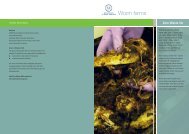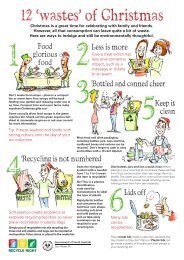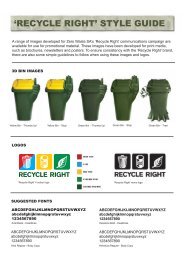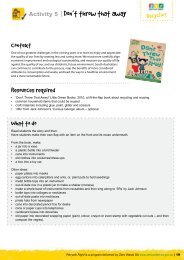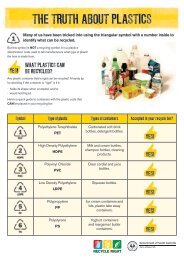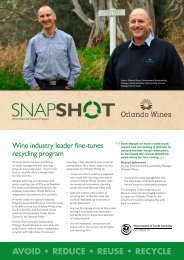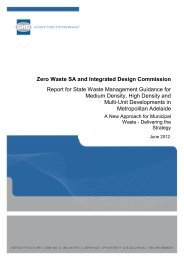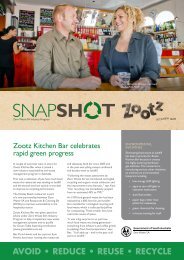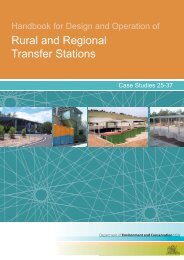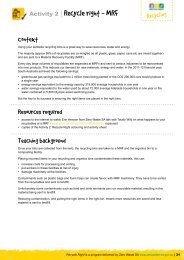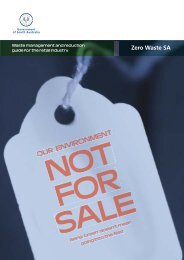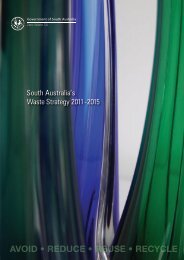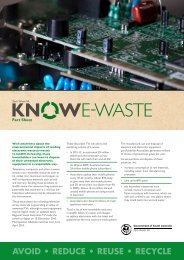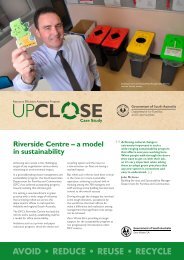Annual Report 2010-11 - Zero Waste SA - SA.Gov.au
Annual Report 2010-11 - Zero Waste SA - SA.Gov.au
Annual Report 2010-11 - Zero Waste SA - SA.Gov.au
Create successful ePaper yourself
Turn your PDF publications into a flip-book with our unique Google optimized e-Paper software.
22<br />
The trials tested a range of measures to increase<br />
confidence for possible future roll out of strategic waste<br />
management and recycling measures across the APY Lands<br />
<strong>Zero</strong> <strong>Waste</strong> <strong>SA</strong> also provided $30,000 to sponsor Watch<br />
Your WASTE Line, the WMAA’s biennial conference held<br />
27–29 October <strong>2010</strong>. The conference focused on food<br />
organics recovery with a comprehensive look at waste in<br />
all areas of society’s food chain, including life cycles, social<br />
behaviours, identified education gaps, and collection and<br />
processing methodologies.<br />
The conference brought together industry, State<br />
<strong>Gov</strong>ernment, local government and not-for-profit groups,<br />
and South Australian, national and international experts<br />
in waste management, to examine and discuss future<br />
directions and best practices for waste management issues<br />
in South Australia.<br />
The conference theme of food waste attracted many<br />
notable speakers including:<br />
> Mr Jon Dee, Founder and Chairman of Do Something,<br />
NSW Australian of the Year for <strong>2010</strong> and Founder of<br />
Planet Ark<br />
> Ms Ronni Kahn, Founder of OzHarvest and Australian<br />
of the Year Local Hero <strong>2010</strong><br />
> The late Mr Kit Strange, Director of Resource Recovery<br />
Forum – UK<br />
> Ms Gabrielle Kelly, Adelaide Thinkers in Residence<br />
Program<br />
> Mr Chris Adams, Orbit Media Group.<br />
The conference also included a day of technical tours<br />
which enabled delegates to visit South Australia’s leading<br />
waste management processing facilities.<br />
Out of councils and remote areas<br />
The project seeks a strategic approach to reducing<br />
waste, increasing resource recovery and improving<br />
landfill management across the APY Lands. This work<br />
involved significant consultation and engagement with<br />
stakeholders, including the APY Lands community and<br />
relevant state government departments.<br />
During 2009–10, <strong>Zero</strong> <strong>Waste</strong> <strong>SA</strong> managed 14 waste<br />
management trials in each major community in the APY<br />
Lands. The project was managed by <strong>Zero</strong> <strong>Waste</strong> <strong>SA</strong> and<br />
supported by $500,000 funding from FaHCSIA.<br />
The trials tested a range of measures to increase confidence<br />
for possible future roll out of strategic waste management<br />
and recycling measures across the APY Lands. Ultimately<br />
this will lead to avoidance, reduction, reuse and recycling<br />
practices that relieve pressure on landfills and improve<br />
health, safety and environmental outcomes.<br />
Specific projects undertaken on the APY lands include:<br />
> collection of 10 cent deposit containers – introducing<br />
a collection system through the schools to reduce<br />
litter, increase recycling and provide an income stream<br />
> bins and bin stands in public places – installing basic<br />
infrastructure that will not be knocked over by<br />
animals<br />
> bins in houses – encouraging the use of rubbish bins<br />
inside houses accompanied by educational training<br />
called ‘Germ Theory’ which explores ‘why’ to use bins<br />
and proper waste management.<br />
Total <strong>Zero</strong> <strong>Waste</strong> <strong>SA</strong> expenditure on this program during<br />
<strong>2010</strong>–<strong>11</strong> was $83,400.<br />
Between 2005 and <strong>2010</strong>, <strong>Zero</strong> <strong>Waste</strong> <strong>SA</strong> worked with<br />
the Aboriginal Affairs and Reconciliation Division of the<br />
Department of the Premier and Cabinet, and with the<br />
Australian <strong>Gov</strong>ernment Department of Families, Housing,<br />
Community Services and Indigenous Affairs (FaHCSIA)<br />
on waste management initiatives on the Anangu<br />
Pitjantjatjara Yankunytjatjara (APY) Lands.



